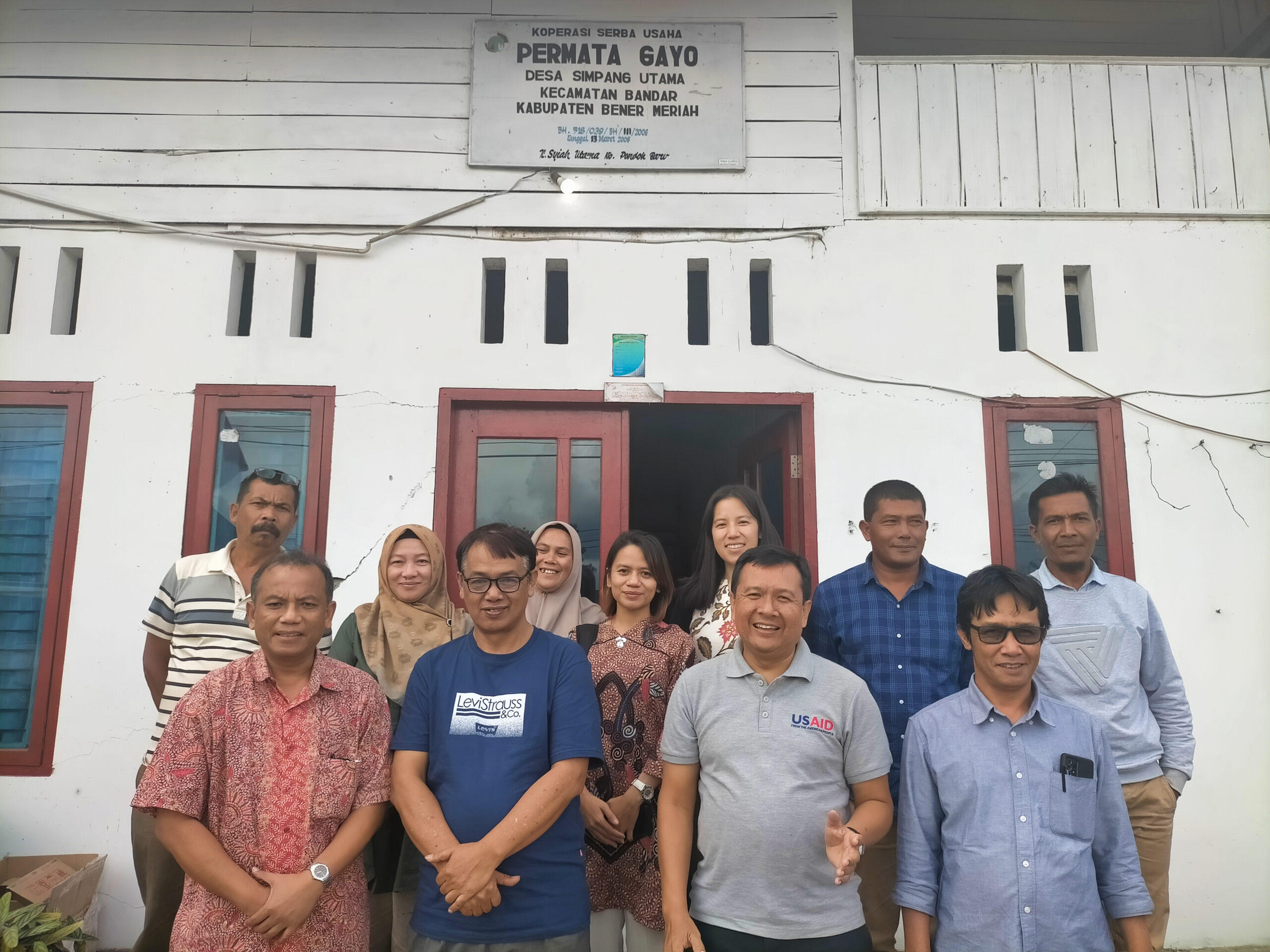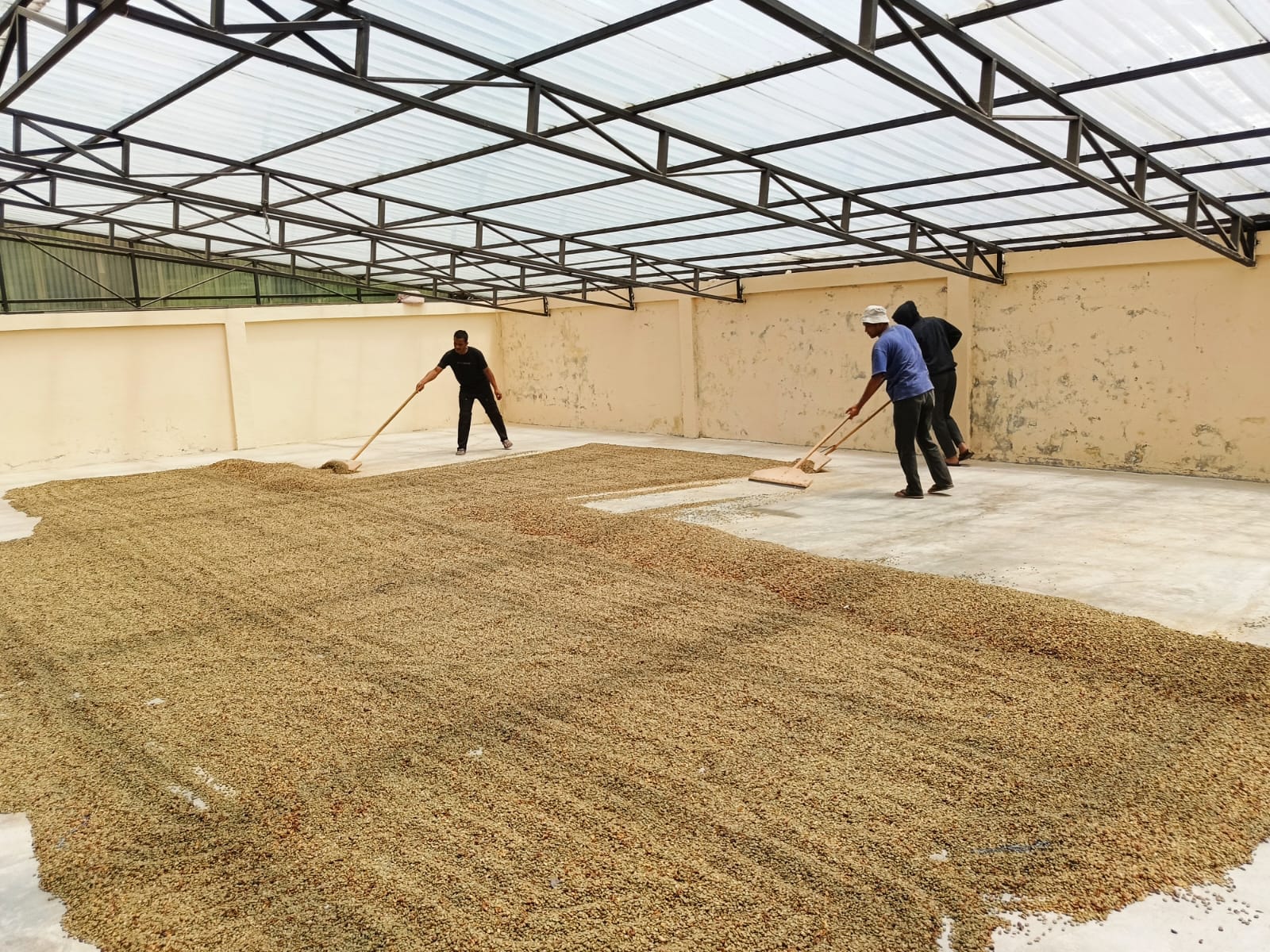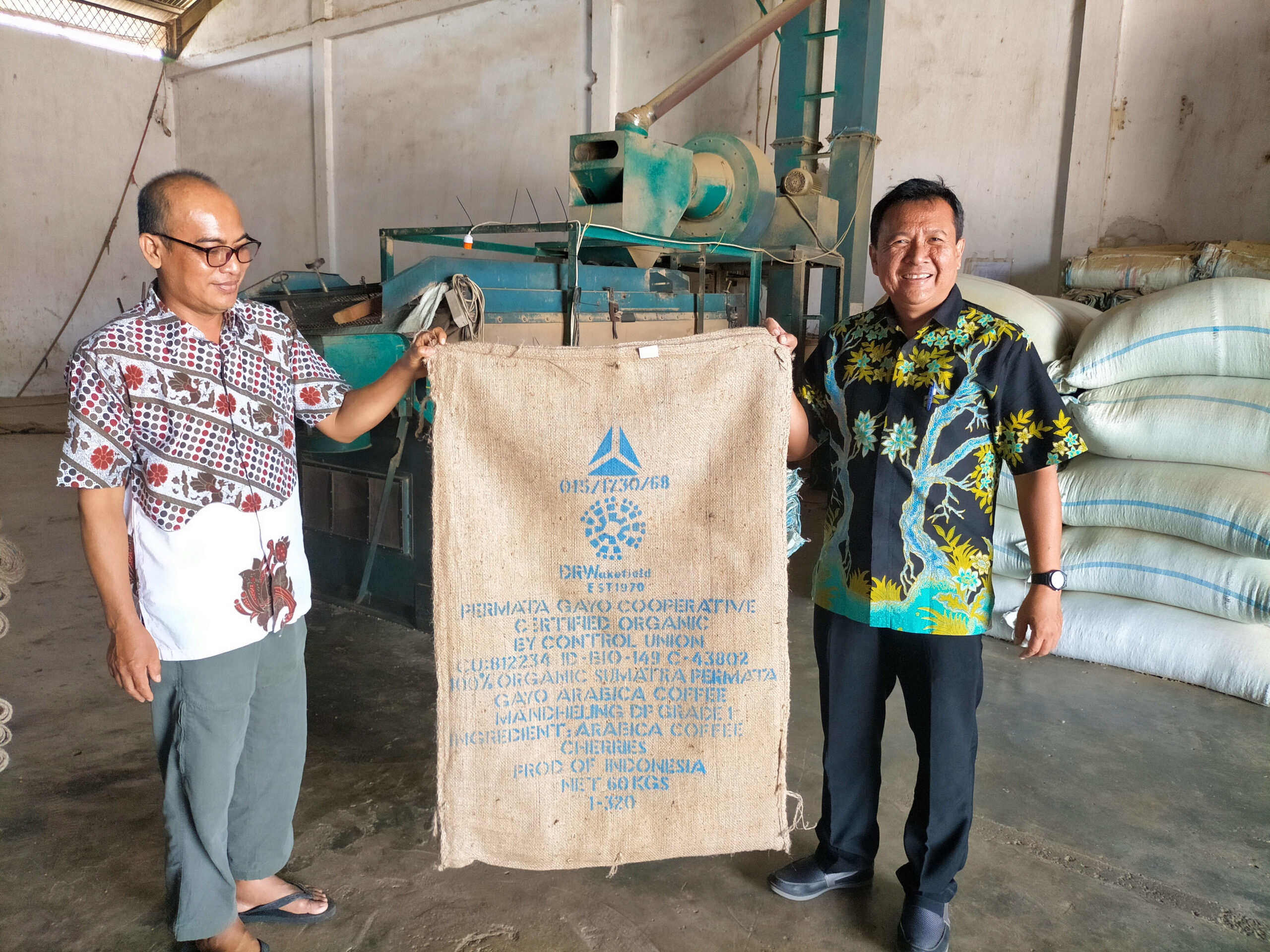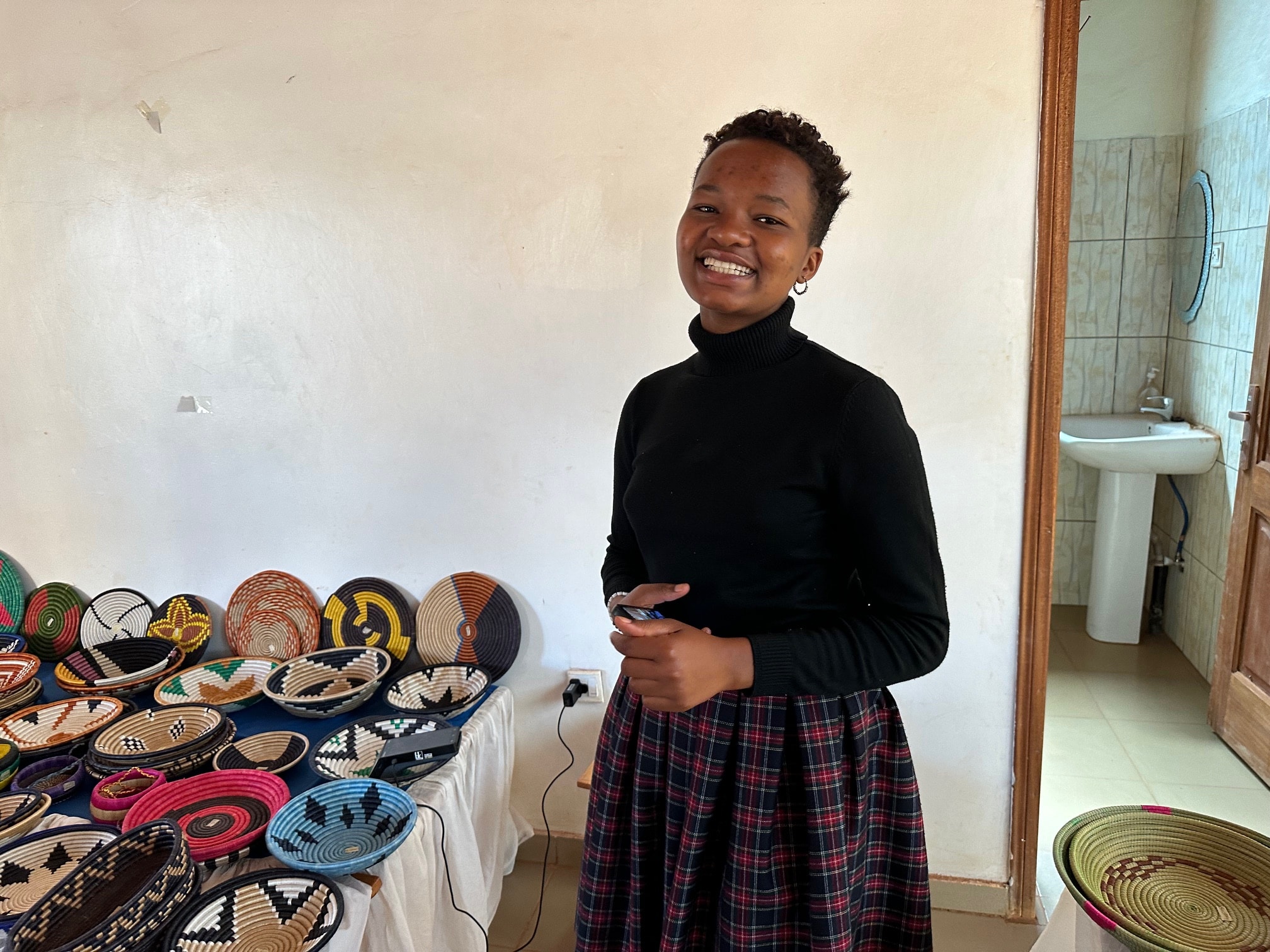 Permata Gayo cooperative members stand outside the cooperative’s headquarters in Aceh, Indonesia. Credit: Root Capital.
Permata Gayo cooperative members stand outside the cooperative’s headquarters in Aceh, Indonesia. Credit: Root Capital.
Sixty percent of the world’s coffee supply comes from smallholder farmers with less than five hectares of land. While their products may account for more than half of the world’s coffee beans, small agricultural cooperatives often lack access to finance and therefore are unable to scale up their businesses. Root Capital’s partnership with the United States Agency for International Development’s then Bureau for Food Security (USAID/BFS, now called the Bureau for Resilience, Environment, and Food Security (USAID/REFS)) works to overcome the challenges faced by these agricultural cooperatives.
Beginning in 2017, Root Capital partnered with USAID/BFS to implement the Partnership for Sustainable Coffee (PSC) Activity. Originally, the Activity was designed with the goal of supporting small coffee cooperatives around the globe through lending and advisory services. But when the COVID-19 pandemic paralyzed much of the world in early 2020, USAID broadened the scope of the Activity to include loan forgiveness relief to cooperatives while also scaling our lending and advisory services to more cooperatives in Africa, Asia, and South America. The Activity also changed its name to the Partnership for Sustainable Supply Chains (PSSC). PSSC created opportunities for more clients across the globe to scale up their growing cooperatives with business management advisory services, debt relief, and resilience grant funds.
Results of PSSC
PSSC reached 75 cooperatives across the world through technical training, resilience grants, and a Debt Relief Fund-some of these cooperatives were even able to engage with more than one area of support. Fifty-seven of these cooperatives engaged in advisory services, 20 received resilience grants to help them weather the pandemic while scaling up their business, and four received debt relief support. In total, producers and firms served by PSSC generated $213.5 million in sales, more than double the original target of $100 million. The 20 cooperatives awarded resilience grants received an average grant of $8,696. The money distributed benefitted more than 6,000 coffee farmers and their families, 1,700 of which were women. The funds from these grants were used for a variety of purposes, but decisions were left to the agricultural businesses themselves. Because these projects were designed by each cooperatives’ employees and farmers, the projects were customized to each enterprise and region. Though, it is worth noting that every enterprise included a gender-inclusivity component in their project. The majority of the cooperatives put funds toward their general business operations while the next largest sum was allocated for COVID safety protocols and access to basic health services. The resilience grants made possible by the PSSC Alliance proved crucial in agricultural cooperatives’ response to COVID-19, allowing our clients flexibility and support as they navigated the pandemic and weathered increasing instances of natural disasters.
While access to finance is key to helping our clients grow, our work over the last five years in partnership with USAID/BFS shows that business management advisory services are also important. However, we were surprised to find little need for the Debt Relief Fund during the pandemic and elected to re-allocate unspent funds toward expanded advisory and lending services for clients. Through the length of the reporting period, Root Capital provided 678 days of advisory services to 57 agricultural cooperatives, far surpassing our goal of conducting advisory services for 45 agricultural cooperatives. Of the employees engaging with technical advisory services, 35 percent were women.
Other achievements from PSSC include:
- In January 2022, USAID/Indonesia, Root Capital, and Keurig Dr Pepper (KDP) launched a three-year $465,000 partnership to build business capacities, climate resilience, and increase gender inclusion and access to financing for coffee cooperatives in Indonesia.
- In May 2022, Root Capital and the U.S. International Development Finance Corporation (DFC) expanded Root Capital’s existing $35 million guaranty facility to $70 million to cover more of Root Capital’s global lending portfolio (geographically and per value chain). We expect the facility expansion to provide coverage for an additional 470 loans, resulting in $354 million in new disbursements over five years and benefitting nearly one million more smallholder farmers.
- In October 2022, USAID/Honduras, Root Capital, KDP, and Catholic Relief Services launched the Feed the Future Honduras Coffee and Community Partnership, a $6.6 million four-year project aimed at increasing cooperative revenues and sustainably connecting 50,000 farmers with global markets.
 Permata Gayo cooperative members spread coffee beans on a warehouse floor to be dried prior to processing and export. Credit: Root Capital.
Permata Gayo cooperative members spread coffee beans on a warehouse floor to be dried prior to processing and export. Credit: Root Capital.
Expanding Production to Achieve Fair Trade Premiums: How Permata Gayo and Root Capital Increased Opportunities for Coffee Producers in Indonesia
“Gayo Mountain” coffee is known for its lingering flavor of earthy, sweet green pepper and red fruit. It is named after the ancestral residents of Aceh, the Gayonese, who have been harvesting prized coffee for centuries from the fertile soil of their homeland. While the crops themselves may thrive in this densely vegetative, mountainous region, the farmers that work there often lack access to the markets and finance needed to succeed. Through PSSC, Root Capital, with USAID and other philanthropic support, loaned working capital, conducted advisory services, and provided small catalytic grants to help the growing agricultural cooperatives that serve smallholder farmers scale up their business and connect to valuable markets, including the Indonesian coffee cooperative Permata Gayo.
Permata Gayo’s territory covers multiple villages in the Bener Meriah regency of the Gayo Highlands of northern Aceh on the Indonesian island of Sumatra. The cooperative, which exports green coffee beans to the U.S. and Europe, connects smallholder producers from Sumatra to even more international markets, increasing farmer livelihoods and bringing capital into rural communities.
Our Partnership with Permata Gayo
Founded in 2006 and originally comprising 50 farmers across five villages in the Bener Meriah Regency, Permata Gayo received many impressive awards in their first few years of operations-an organic certification from the Control Union, a Fairtrade certification, and a Rainforest Alliance certification-all the while growing their membership. By centralizing the cultivation and processing of their coffee crops, Permata Gayo improved the quality of their product while cutting out middlemen to maximize farmer payouts.
Today, Permata Gayo boasts more than 2,000 cooperative members from 39 villages across Sumatra. The organization’s emphasis on poverty reduction in Indonesia and environmental sustainability practices make it an ideal recipient of the Alliance’s lending and advisory services. Permata Gayo became a Root Capital lending client in 2015-one of our first in Indonesia. Since then, Root Capital has loaned Permata Gayo more than $6 million-all of which has been paid back in full. Permata Gayo’s sales have improved with the support of the Alliance, allowing it to purchase more than $21 million of coffee from more than 2,000 smallholder farmers over the course of PSSC. This infusion of money into local economies helps increase incomes and allows rural communities to prosper.
 Pak Syamsudin, left, from the Export Division of Permata Gayo, and USAID/Indonesia Project Management Specialist Mispan Indarjo, right, display a burlap sack with the cooperative’s name and certifications listed at their warehouse in Medan on Sumatra. Credit: Root Capital.
Pak Syamsudin, left, from the Export Division of Permata Gayo, and USAID/Indonesia Project Management Specialist Mispan Indarjo, right, display a burlap sack with the cooperative’s name and certifications listed at their warehouse in Medan on Sumatra. Credit: Root Capital.
Quality Control Improvements from Centralized Production
A notable improvement from the support of the PSSC Alliance is Permata Gayo’s impeccable quality control processes. In the past, the cooperative would be forced to reject containers of product for inconsistencies, but they have not had to reject a single container of product since 2013.
Additionally, Permata Gayo previously sold coffee in bulk, but they purchased a cupping station and invested in better quality control systems with a $10,000 resilience grant from PSSC. By keeping cultivation and processing in-house, they significantly increased the quality of their product and transitioned to the (more lucrative) specialty coffee sector.
Growing Sales to Increase Fairtrade Premiums for Farmers
Thanks to the lending and advisory services from the PSSC Alliance, Permata Gayo scaled up their business, was able to buy more crops from farmers and found a larger market for their certified coffee, earning the cooperative a total of $260,000 in premiums in 2021, which was democratically metered out by a committee of cooperative members. About half of those funds were invested back into the business as working capital to cover salaries, machine purchases, and certification costs. The other half was used for a range of social and environmental programs to benefit the community. For example, the cooperative sponsored health and education courses, and gave out cash bonuses to members. Remaining premium was put toward the distribution of rice, palm oil, and sugar to members during the off season.
Permata Gayo also designates part of their premium to fund a cultural school in the community for children to learn traditional Gayonese song and dance. The ripples of social, economic, and environmental effects would not have been possible without the resources afforded to Permata Gayo by the PSSC Alliance. By continuing to support community-minded agricultural cooperatives like Permata Gayo, USAID/REFS and Root Capital create lasting positive, material changes in the rural communities that need it the most.
As we continue to work together to ensure success for our clients around the globe, Root Capital is thankful for our partners: the United States Agency for International Development’s Bureau for Resilience, Environment, and Food Security (USAID/REFS), Keurig Dr Pepper (KDP), and Ezrah Charitable Trust.
 About the Author
About the Author
Tess Fisher is the Content Development Associate at Root Capital.
You may also be interested in...

What Is an Engine of Impact?
As a writer at Root Capital, I often describe our clients as “engines of impact.” We
Date:
